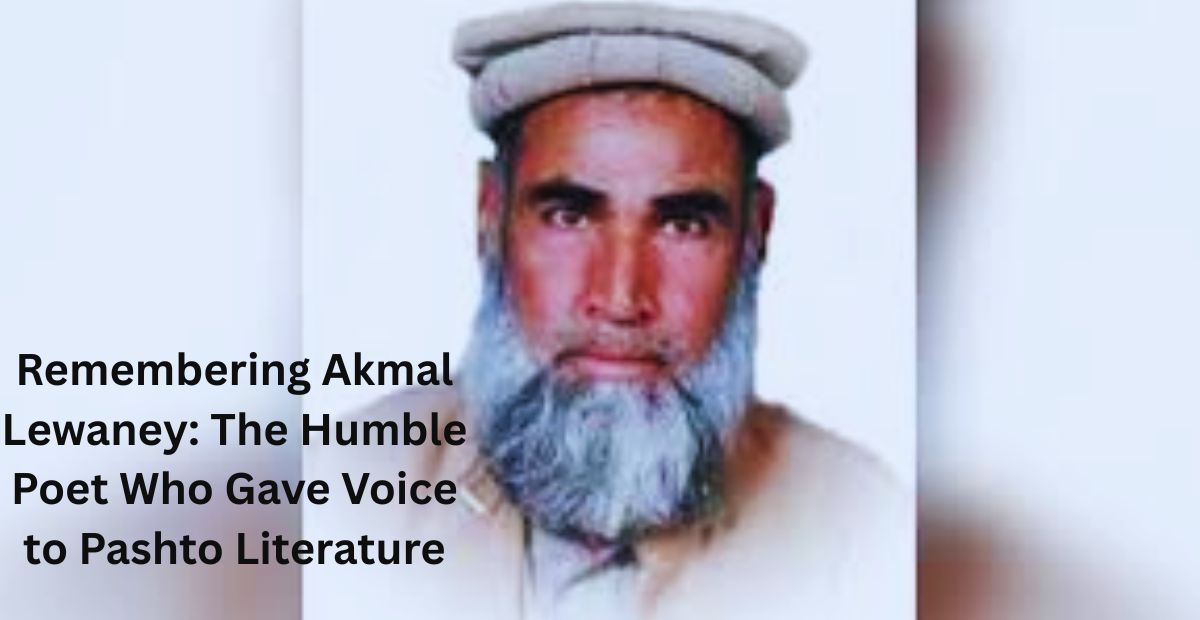Akmal Lewaney (1946 – 9 May 2024), affectionately known by his pen name Lewaney, was more than a poet—he was a cultural icon in Pashto literature. Born in the serene village of Shamozai in the Mardan District of Pakistan, Lewaney’s literary contributions shaped generations of readers, poets, and nationalists. His life story is a testament to how passion, perseverance, and patriotism can triumph over educational and economic limitations.
Early Life and Education
Akmal Lewaney was born in 1946 into a humble family in Shamozai. Like many in rural areas, he faced economic hardships early in life. His formal education ended after the second grade, as he had to join his parents in the fields to support the family. Yet, his thirst for knowledge and expression couldn’t be stifled. Despite limited schooling, Lewaney taught himself to read and write—planting the seeds of a lifelong relationship with poetry.
A Young Poet’s Journey
At just 15 years old, Lewaney penned his first poetry collection, Yao So Gallona (“A Few Words”). This early debut marked the beginning of an extraordinary literary journey. Unlike many poets who rely on academia, Lewaney drew inspiration from real-life struggles, humor, and the socio-political atmosphere of his homeland. His poetry was raw, relatable, and resonated deeply with ordinary people.
Career and Nationalist Spirit
Lewaney was closely associated with the Khudai Khidmatgar movement, led by Bacha Khan, which aimed to promote nonviolence and social reform among Pashtuns. His poetry reflected these values—peace, resistance, and cultural pride. He remained committed to the cause of Pashtun identity and nationalism throughout his life.
Some of his most notable works include:
- Lewantob
- Chapawoona
- Ajeeba Paigham
- Tortam
These collections offer a blend of satire, philosophical reflection, and heartfelt emotion, making Lewaney a distinct voice in Pashto poetry.
Promoting Book Culture: The Mobile Stall Legacy
One of Lewaney’s most remarkable contributions was his dedication to promoting reading culture. Known as “Da Kitabuno Banjara” (The Book Nomad), he would travel across cities and villages with mobile book stalls. Whether it was a cultural fair or a small literary gathering, Lewaney was there—selling books, sparking conversations, and inspiring the youth. His efforts not only provided for his family but also revived interest in Pashto literature.
A Voice of Humor and Hope
What set Akmal Lewaney apart was his ability to weave humor into complex issues. His witty verses made his poetry both accessible and thought-provoking. He used humor as a tool to critique social injustice, mock ignorance, and celebrate life. Readers admired him for being a fearless critic and a beacon of hope.
Legacy and Death
After a prolonged illness, Akmal Lewaney passed away on 9 May 2024 at the age of 78. His death marked the end of an era, but his legacy lives on in the hearts of those who read and cherished his work. Tributes poured in from across the literary and political spectrum, recognizing him as a symbol of cultural resilience and poetic brilliance.
Conclusion
Akmal Lewaney’s life is a powerful reminder that true art transcends education, wealth, and social barriers. From the fields of Mardan to the pages of Pashto literary history, he carved a place for himself with sheer determination, humor, and love for his people. His mobile book stalls, poetic genius, and nationalist ideals continue to inspire the future generations of Pashto poets and readers.
Keywords: Akmal Lewaney, Pashto poet, Lewaney poetry, Pashto literature, Khudai Khidmatgar, Pashto book culture, Lewaney biography, Pashto nationalism, Akmal Lewaney death, Lewaney poems
Would you like help formatting this for a blog platform like WordPress or Blogger?
